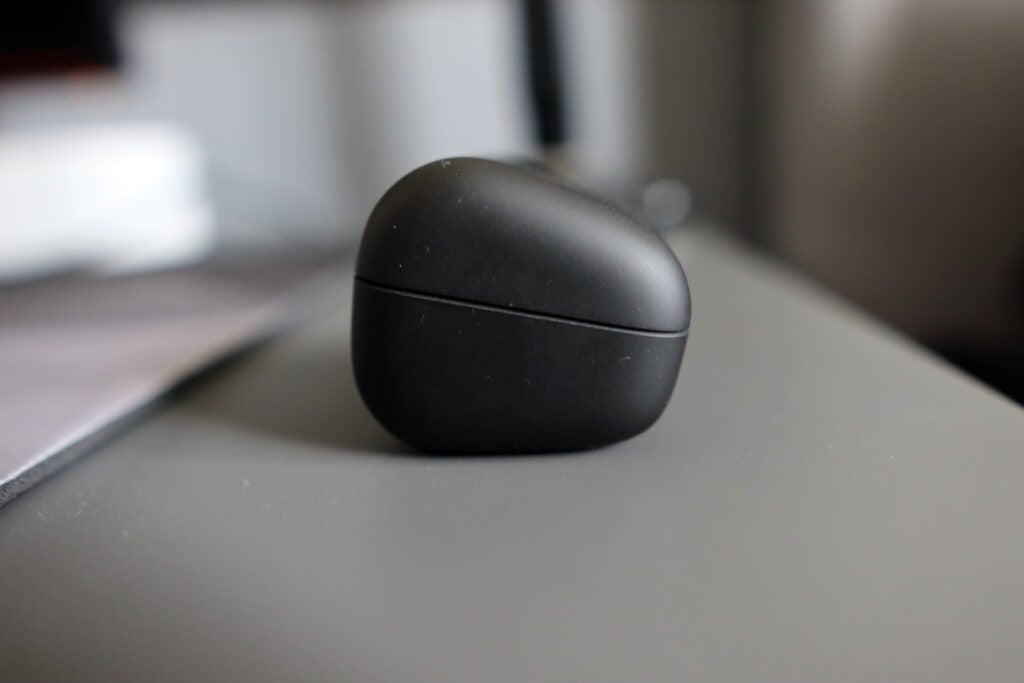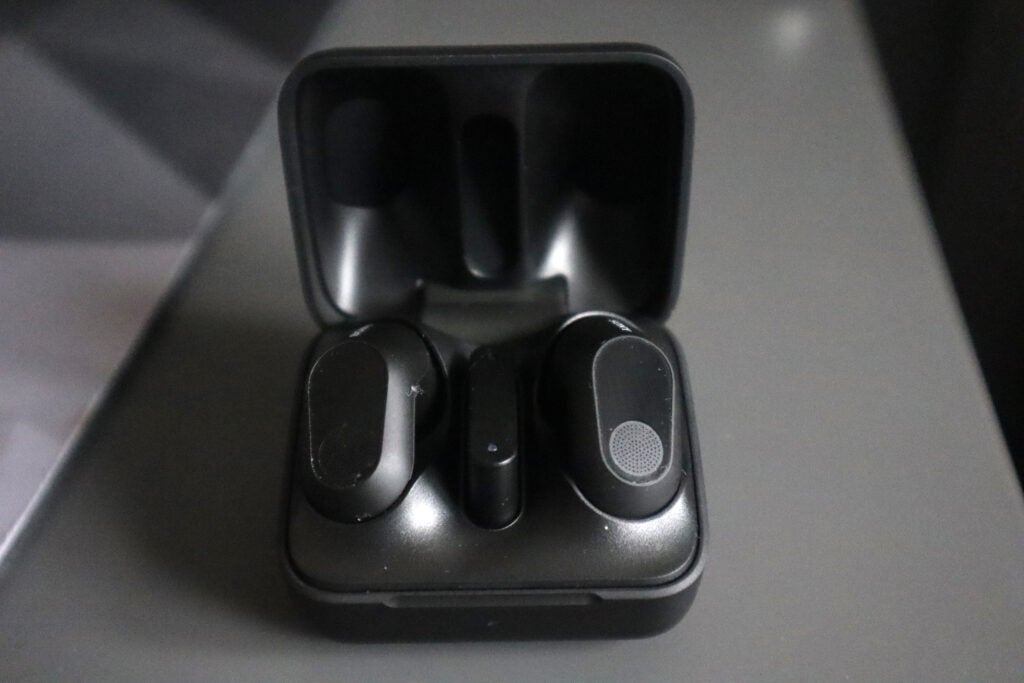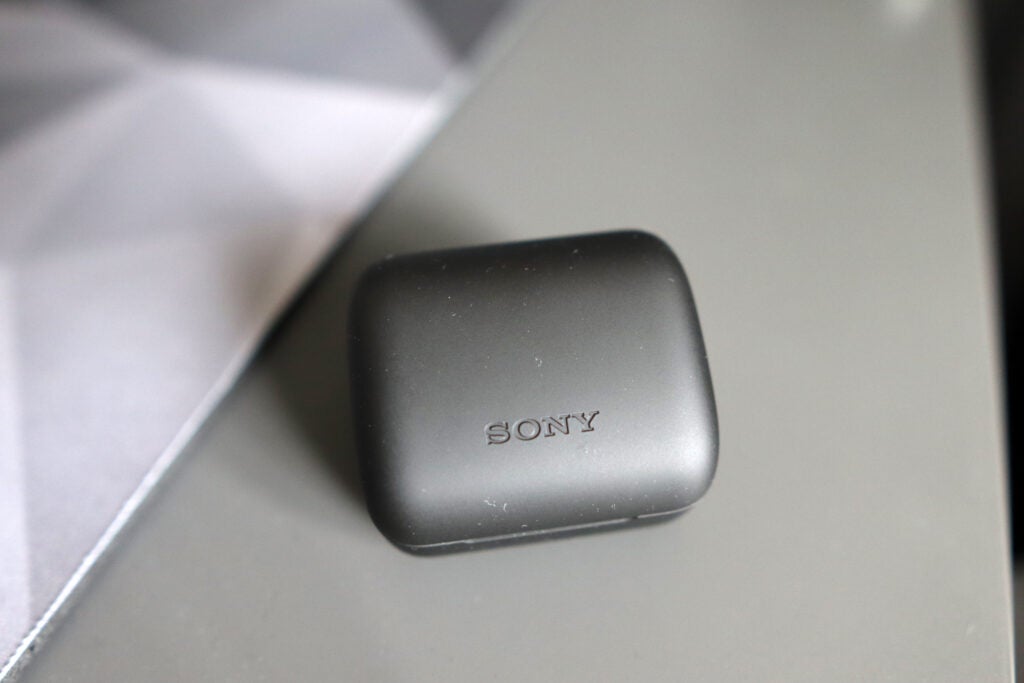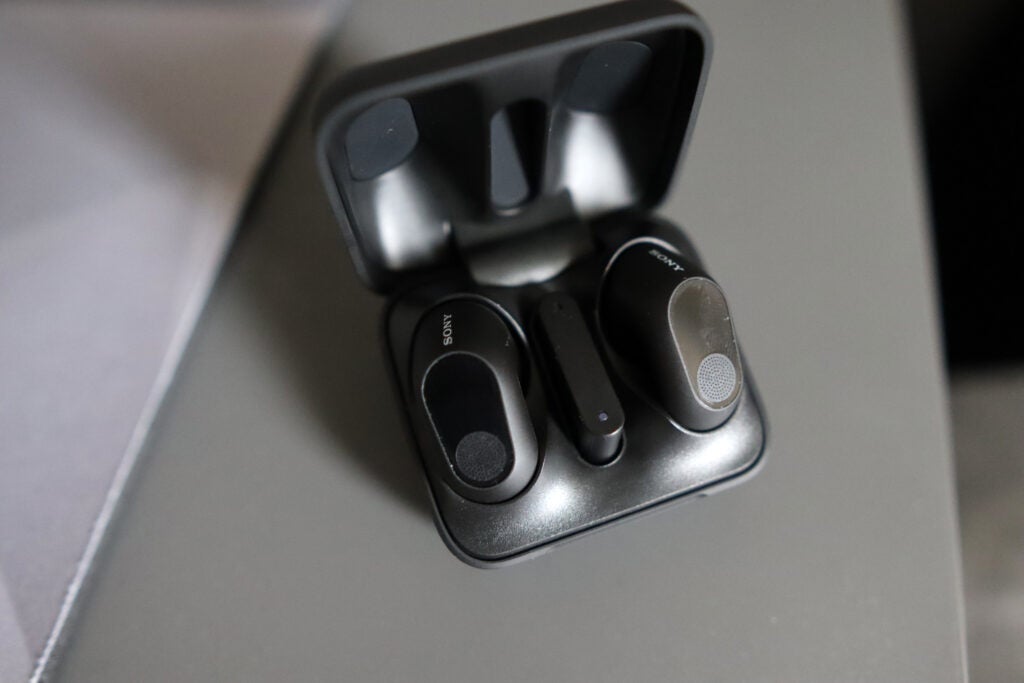Verdict
The Sony Inzone Buds are an impressive set of gaming earbuds. They’re both stylish and offer marvellous noise cancellation, alongside rich audio. Battery life is freeing and the companion app is user-friendly. Unfortunately, connectivity is a little fiddly.
Pros
- Comfortable fit
- Warm and wide sound
- Sublime ANC
- Excellent battery life
Cons
- Thick charging case
- Connectivity is inconsistent
- Mic is rather thin sounding
-
Strong battery lifeSony rates the Inzone Buds to last for up to 24 hours total on a charge (12 hours from the buds, and 12 more from the case) -
Active noise cancellationFeaturing ANC, designed to block out unwanted noise from the outside, using the same system as Sony’s current WF-1000XM5 earbuds. -
Bluetooth LE connectionConnectivity via a USB-C wireless receiver, through Bluetooth Low Energy.
Introduction
In-ear headphones designed specifically for use with consoles are few and far between, especially for first-party solutions. The Sony Inzone Buds aims to change the balance.
They build on the fundamentals of their class-leading noise-cancelling earbuds and have combined them with some interesting new features to offer one of the more premium and interesting experiences I’ve had with a headset this year.
Whether these can shape as one of the best PS5 headsets (of sorts) remains to be seen though – let’s take a closer look.
Design and Features
- Smart looks and comfortable fit
- Big charging case
- Top-class noise cancellation
- Great battery life
The Inzone Buds immediately impress with their smart, but mean look in the black colourway I’ve got here. The buds feature a mix of a matted and glossy finish, which looks good, although may be susceptible to grease and grime with prolonged use. They are also available in white, which matches better with the PS5’s colourway.
There’s no RGB lighting of sorts on either the buds or the charging case either, continuing that mean look. By comparison to similarly priced ANC earbuds though, the charging case of the Inzone Buds is especially chunky and thick, making it quite difficult to fit into clothes with minimal pockets. The case itself features an engraved Sony logo, as well as a USB-C port for charging around the back.

Their fit with the default tips is relatively comfortable, and the fact the Inzone Buds opt for a traditional in-ear type design that almost resembles recent AirPod Pro models makes them easy to work with and fit in your ears. The default tips also provide a decent seal, helping along with their excellent ANC, but if you do need different ones, Sony provides a good selection of smaller and larger options in the box.
Where the Sony Inzone Buds fall down a little is with their touch controls. They aren’t very responsive, and toggling between different connectivity modes requires quite a long press on either earbud. Tapping the left earbud toggles the Ambient mode for noise cancelling, while a double tap initiates an incoming call, or cancels an existing one. Tapping the right earbud increases the volume incrementally, and double tapping also controls calls. It’s a bit confusing, but not a huge problem.
The Inzone Buds feature Sony’s top-class active noise cancellation, which marks out some of the best ANC I’ve had in a set of earbuds, rivalling more generalist pairs I’ve used that are similar in price. They envelop you in silence and did a fantastic job of drowning out chattering and train noise when I used them on the Underground to commute into London. Some sounds were dampened, while others completely eliminated. The Ambient mode allowed noise back through and presented it naturally.

As much as the ANC is fantastic, the same isn’t necessarily true for the Inzone Buds’ connectivity. Inside the charging case, Sony provides a 2.4GHz wireless USB-C dongle to connect the earbuds to either a PC or a PS5. Getting it to work proved a faff, as the buds default to ‘Bluetooth’ mode when switched on. To work via the receiver, they need to be moved to ‘Transceiver mode’. Doing so meant they were plug-and-play with my PC and my phone, although I should say they refused to connect to my Galaxy S21 Ultra when tried with standard Bluetooth.
The thing is, the Inzone Buds are technically Bluetooth earbuds, but they work over Bluetooth LE, as opposed to the more common Bluetooth Classic. It caused some small teething problems, and the Inzone Buds also outright refused to work with my MacBook Pro. You’ll just have to be wary of which devices you’re going to be using the Inzone Buds with to make sure that they’re compatible.
The benefit of using Bluetooth LE as opposed to a Bluetooth Classic connection is improvements in battery life. To this end, the Inzone Buds offer a total 24 hours of battery life, which makes them class leaders here, too. It’s split evenly between the case and the earbuds, which is nice to see, as it’s usually weighted more towards the case. What’s more, the USB-C charging on the case is also convenient. You can pop them in the case for 5 minutes and get 1 hour of battery life if you’re ever caught short.

There isn’t a dedicated mobile app for the Inzone Buds, but they integrate with Sony’s Inzone Hub. Here you can enable support for Sony’s spatial audio, which requires some configuration with your ears to create a custom hearing profile, as well as enabling and disabling the ANC and customising the Inzone Buds’ touch controls. Much like with the Inzone H5, the software is presented cleanly and is easy to navigate.
Audio and Microphone
- Warm and crisp overall tone
- Lack of a low-end thump
- Immersive presentation with spatial audio enabled
The most important thing though is how the Inzone Buds sound, and it’s safe to say I had high expectations. They feature the same drivers as the Japanese brand’s most recent noise-cancelling earbuds, the WF-1000XM5s, and perhaps unsurprisingly, they sound rather good.
Even without the spatial audio trickery, the Inzone Buds featured a wide soundstage and a good sense of placement, as well as a generally warm tone that made them an enjoyable listen to a wide range of genres, especially singer-songwriters such as James Taylor, Mac McAnally and John Martyn. A live cut of Mac McAnally’s That’s Why They Call It Falling showed the Inzone Buds to be crisp and clear with marvellous separation between the vocals and warm acoustic guitar. The sharp, high synth notes on Steve Hogarth’s Cage were handled well, as was the intimacy of the song’s whispered vocal, emphasising the Inzone Buds’ clarity and warmth.

Moving over to Earth Wind and Fire’s September, the bongos were where they should be – far off to the right – but remained punchy and sharp. The track demonstrated the marvellous soundstage that the Inzone Buds have, which was only enhanced by the spatial audio that can be enabled in the Inzone Hub software. However, it did leave me wanting a little more in terms of their bass. The Inzone Buds low end is present, but it doesn’t have as much extension or feeling to it, as was present on Rush’s YYZ, a notoriously busy song thanks to Geddy Lee’s relentless bassline. For my money, Sennheiser’s Momentum True Wireless 3 offer a fuller presentation here.
That perceived lack of bass fed into a less impactful presentation in FPS titles such as CS:GO as I would have expected, with explosions from grenades seeming a little flat. However, the spatial audio trickery that the Inzone Buds feature lent itself to a generally immersive experience with marvellous placement of footsteps and enemy gunfire.
The microphone present with the Inzone Buds is passable, and arguably how you’d expect one from a set of earbuds to sound. Its sounds rather basic and it can come across like you’re quite far away but, in testing, friends and family had no complaints about how I sounded over the phone or on Discord. It also benefits from Sony’s AI noise cancellation, which did a solid job of eliminating loud noises such as me typing on my keyboard while talking to friends.
Latest deals
Should you buy it?
You want great audio and ANC
Featuring the fundamentals of Sony’s fantastic ANC earbuds has worked well for the Inzone Buds and they offer rich and warm audio with sublime noise cancellation.
You want more convenient connectivity
I appreciate the use of a BLE receiver, but it is a little limiting as the Inzone Buds simply won’t work with some platforms. More typical Bluetooth earbuds will offer you a better choice, as will headsets with dedicated dual means of connectivity.
Final Thoughts
Well, for a first attempt, the Sony Inzone Buds are a marvellous set of gaming earbuds. They’re comfortable and look, also providing some great battery life and a convenient companion PC app. Noise cancelling is fantastic, and the warm, full-bodied audio makes music and games a pleasure.
There are just a couple of little issues that prevent them from being some of the best earbuds available today. The big one is their connectivity – opting for a purely Bluetooth LE setup means you immediately wipe out devices that don’t support it, such as certain Apple products and Nintendo Switch. Other smaller issues are touch controls which don’t feel the most responsive, but that’s a wider symptom of modern earbuds and their hatred towards buttons or more tactile controls.
For other options though, check out our roundup of the best gaming headsets.
How we test
We use every headset we test for at least a week. During that time, we’ll check it for ease of use and put it through its paces by using it in a variety of games, as well as playing music in order to get the full experience.
We also check each headset’s software (if applicable) to see how easy it is to customise and set up.
We use as our primary gaming headset for at least a week.
Use on as many platforms as possible to test versatility.
Judge audio for both gaming and music playback.
Use with multiple games to test audio.
FAQs
Sony’s Inzone Buds are rated for a total of 24 hours of charge, 12 from the case, and 12 from the earbuds themselves.
The Inzone Buds connect via Sony’s Bluetooth LE receiver included in the box, allowing them to work with PS5 and PC, as well as certain mobile devices. However, their lack of other connectivity means that some platforms, such as MacOS devices, won’t work with them.
























